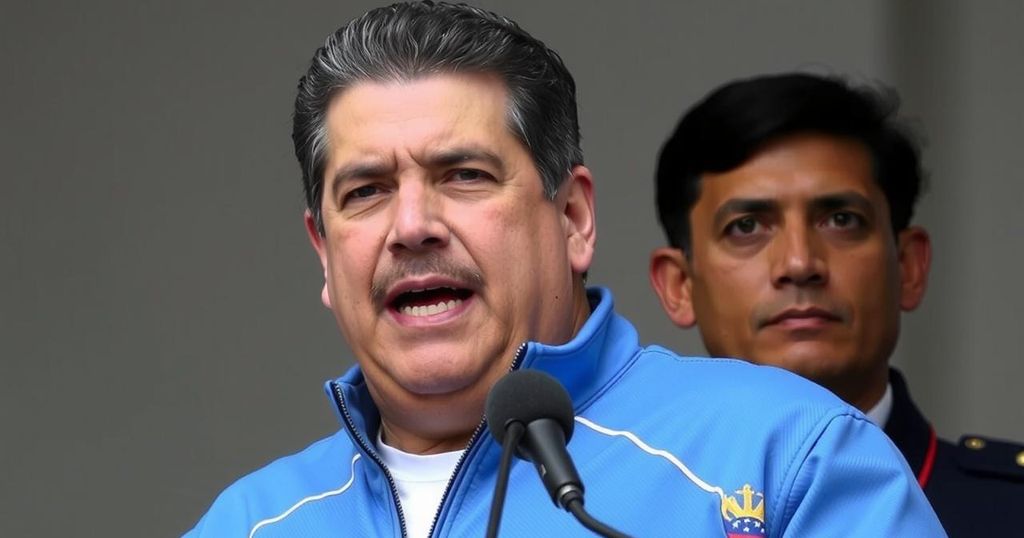Venezuelan President Nicolás Maduro Begins Controversial Third Term

Nicolás Maduro is set to begin his third term amid widespread skepticism regarding his electoral victory. Despite claiming to have won by over a million votes, many believe opposition candidate Edmundo González is the true victor. The political climate is compounded by a crackdown on dissent, with significant international concern over human rights abuses and calls for protests by the opposition. The response of the incoming Trump administration could be pivotal for Venezuela’s future.
Nicolás Maduro, the Venezuelan leader, is set to commence his third term in office on January 10, amidst heavy scrutiny over the legitimacy of his election victory last year. The ruling party’s congress will oversee the swearing-in ceremony, despite extensive doubts raised by both international observers and domestic opponents regarding the electoral process. Maduro purportedly won the election by over one million votes, although many believe that opposition figure Edmundo González was the rightful victor. The Carter Center, which observed the elections at Maduro’s invitation, confirmed the authenticity of the opposition’s published tally sheets.
The upcoming oath-taking marks a continuation of Maduro’s policies, which have contributed to severe issues of cronyism, inflation, and food shortages in Venezuela throughout his tenure of over 11 years. In light of Maduro’s inauguration, opposition leaders have called for mass protests. Nonetheless, a climate of fear, exacerbated by a brutal crackdown resulting in over 2,000 arrests, may restrict public dissent. High-profile opposition leader María Corina Machado plans to return to the political scene after a period in hiding, making a last-ditch effort to challenge Maduro’s authority.
Edmundo González, who has gained recognition from the United States as the legitimate president-elect, fled to Spain following an arrest warrant issued against him. Recently, he has emerged, engaging in international advocacy to bolster support for the opposition, including a meeting with President Biden. Amid these developments, Venezuelan authorities placed a reward for information on González’s whereabouts, further indicating their intention to detain him.
As Maduro’s administration coincides with a prospective second term for Donald Trump, speculations arise regarding the U.S. approach to Venezuela. Trump’s previous administration was marked by strong opposition to Maduro, and although Maduro has extended an olive branch, some experts caution that effective negotiations should focus on liberating Venezuela from its current regime. Prominent analysts emphasize the necessity of continued pressure on Maduro’s government to address the threats posed by organized crime and regional instability, urging a non-negotiable commitment to Venezuelan freedom.
As the political climate unfolds, speculation persists regarding the strategies newly appointed officials in the Trump administration might pursue in dealing with the Venezuelan crisis, particularly in light of the humanitarian outflow of Venezuelans since 2014, when approximately 7.7 million individuals have sought refuge abroad. The stance taken by the new administration will crucially influence both U.S. foreign policy and the potential for political change in Venezuela.
The political landscape in Venezuela has been tumultuous for years, characterized by rampant economic mismanagement, human rights violations, and authoritarian rule under Nicolás Maduro. His leadership has fostered widespread poverty and socio-economic struggles, leading to a significant exodus of Venezuelans seeking more favorable conditions abroad. The 2022 presidential elections were marred by disputes over legitimacy, alongside allegations of electoral fraud, particularly from the opposition which claims that the actual candidate victor was Edmundo González. This election reflected broader concerns about the erosion of democratic practices in Venezuela and the international community’s response to such governance.
In sum, Nicolás Maduro’s inauguration for a third term raises serious questions regarding electoral legitimacy in Venezuela, with significant domestic and international opposition highlighting the perceived injustice of the electoral process. As González seeks to rally support against Maduro, the potential shift in U.S. policy under the incoming Trump administration is critical, given the previous confrontational stance and ongoing humanitarian crisis in Venezuela. Continued pressure and international support for a transition towards democratic governance remain vital for the pursuit of a free and stable Venezuela.
Original Source: www.foxnews.com








